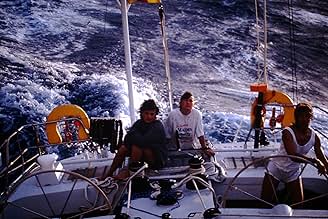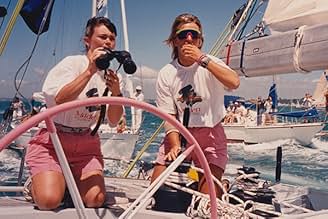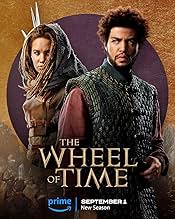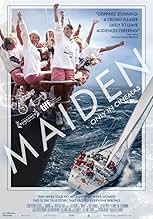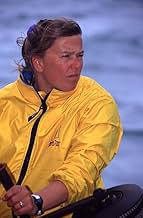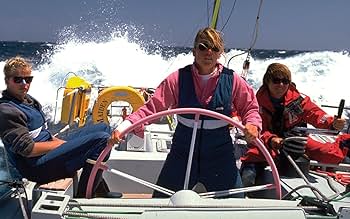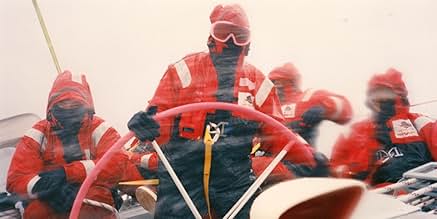IMDb RATING
7.8/10
2.7K
YOUR RATING
The story of Tracy Edwards, a 24-year-old cook on charter boats, who became the skipper of the first ever all-female crew to enter the Whitbread Round the World Race in 1989.The story of Tracy Edwards, a 24-year-old cook on charter boats, who became the skipper of the first ever all-female crew to enter the Whitbread Round the World Race in 1989.The story of Tracy Edwards, a 24-year-old cook on charter boats, who became the skipper of the first ever all-female crew to enter the Whitbread Round the World Race in 1989.
- Nominated for 1 BAFTA Award
- 8 wins & 11 nominations total
Frank Bough
- Self
- (archive footage)
Pat Edwards
- Self
- (archive footage)
Bob Fisher
- Self
- (archive footage)
Barry Pickthall
- Self
- (as Barry Rickthall)
Featured reviews
One of the best sporting documentaries ever made, you are with the all female crew (even if you are male) all the way. Through the all the lows and all the highs. The original footage makes it totally authentic. There is excitement, humour and pathos. There are no dull moments or flat spots, the film just grips you from start to finish. You don't have to like sailing or documentaries to love this movie.
"Maiden" (2018 release; 97 min.) is a documentary about the all-female crew of the Maiden in the Whitbread Round the World sailing competition. As the movie opens, it is "September 2, 1989, Southampton", the day that the Whitbread race begins, and we get to know Tracy Edwards, the 27 year old skipper of the Maiden. We then go back in time to Tracey's upbringing, where her parents instill a sense of determination in her. It eventually leads her to want to compete in the Whitbread race, and in 1986 she announces her intent to do the 1989 race with an all-female crew... At this point we are 10 min. into the movie.
Couple of comments: this is the latest documentary from Alex Holmes. Holmes one the one hand uses the ample archive video and TV footage from that era, and also interviews the 12 member crew of the Maiden, who all look back to what took place in the late 80s with a sense of pride and amazement. Tracy Edwards makes a great subject matter and interviewee. When you see this young woman not only have the dream of doing this, and then actually DOING it albeit not without problems and challenges, you feel so inspired. (One of the biggest challenge turned out to be finding a sponsor for the boat: Edwards approached literally hundreds and hundreds of companies, and NOT ONE SINGLE company was interested in stepping up. How she managed this financially is explained in the film.) There is an amazing amount of footage from on the ship itself, and it raised the hairs on my arms as you see them sailing on the Southern oceans. I am going on record already to predict that "Maiden" will get an Oscar nomination for BEst Directory early next year.
I had seen the trailer for "Maiden" and couldn't wait to see it. The film opened this weekend at my local art-house theater here in Cincinnati. The Sunday early evening screening where I saw this at was attended poorly (5 people in total). That's a darn shame. Hopefully this film can find a much deserved wider audience as it launches on other platforms. If you like a good documentary whose timing in today's climate of gender equality is perfect, I'd readily suggest you check this out, be it in the theater, on VOD, or eventually on DVD/Blu-ray, and draw your own conclusion.
Couple of comments: this is the latest documentary from Alex Holmes. Holmes one the one hand uses the ample archive video and TV footage from that era, and also interviews the 12 member crew of the Maiden, who all look back to what took place in the late 80s with a sense of pride and amazement. Tracy Edwards makes a great subject matter and interviewee. When you see this young woman not only have the dream of doing this, and then actually DOING it albeit not without problems and challenges, you feel so inspired. (One of the biggest challenge turned out to be finding a sponsor for the boat: Edwards approached literally hundreds and hundreds of companies, and NOT ONE SINGLE company was interested in stepping up. How she managed this financially is explained in the film.) There is an amazing amount of footage from on the ship itself, and it raised the hairs on my arms as you see them sailing on the Southern oceans. I am going on record already to predict that "Maiden" will get an Oscar nomination for BEst Directory early next year.
I had seen the trailer for "Maiden" and couldn't wait to see it. The film opened this weekend at my local art-house theater here in Cincinnati. The Sunday early evening screening where I saw this at was attended poorly (5 people in total). That's a darn shame. Hopefully this film can find a much deserved wider audience as it launches on other platforms. If you like a good documentary whose timing in today's climate of gender equality is perfect, I'd readily suggest you check this out, be it in the theater, on VOD, or eventually on DVD/Blu-ray, and draw your own conclusion.
Sail around the world with a fearless female crew - the first ever only 30 years ago to race in the Whitbread and defy critics. Very entertaining, inspiring and funny! A must see even if you're someone who thinks they don't like documentaries.
Greetings again from the darkness. Thanks to Ron Shelton's BULL DURHAM (1988), a favorite sports phrase emerged: 'announcing one's presence with authority'. Perhaps no better phrase exists to describe Tracy Edwards at the 1989 Whitbread Round the World Race. The 24 year old Edwards was the skipper-navigator of the first all-women crew to compete in the race ... a grueling every-three-years event where yachts are sailed around the world in multiple stages/legs.
Director Alex Holmes takes us back to Ms. Edwards' childhood. We see home movies, interviews with friends, and hear stories to prove she wasn't the easiest child to raise. Maybe too much time is devoted to this section, but it picks up when we get to adult Tracy's story about how she was first attracted to the race and got involved as a cook on one of the vessels. She talks about being treated like a servant by the crew and how that inspired her idea to assemble an all-woman crew and race their own boat.
The interviews include other skippers (men, of course), the journalists who covered the race (men, of course), and the crew members from the Maiden. We see them today, and have the "then" photos and clips to gain an appreciation of the 30 years that have passed. We hear that "being girls is like being disabled in the sailing world", and one can sense the attitude (even today) of the competitors.
The race covers 33,000 nautical miles, but Ms. Edwards' historic voyage started long before they set sail. She speaks to the difficulty of fundraising - two years of almost no money, and how Jordan's King Hussein not only inspired her, but also assisted. A second-hand boat at a reduced cost put the crew to work on rehabilitation, and this 'sweat equity' likely made them more determined than ever.
"The probability of not making it is high." Self-doubt and insecurities bubbled up. Once the race got underway, the women were a team. Terrific archival footage puts us right there with the crew - massive waves, ice on the sails, incredible cold and wind. These obstacles from nature care not if the crew is man or woman. Ms. Edwards' leadership is on full display during the various legs of the race. It's clear by the end that they have gained respect of those who doubted them, and the warm reception proves how strong their fan base was. It's certainly not the first sports movie featuring underdogs. In fact, the Jamaican bobsled team is a comparison that comes to mind as a group of dedicated competitors given little chance to succeed by those 'in the know'. Here's hoping the inevitable Hollywood dramatization never occurs, as no actor could tell it better than those who performed the work and raced the race.
Director Alex Holmes takes us back to Ms. Edwards' childhood. We see home movies, interviews with friends, and hear stories to prove she wasn't the easiest child to raise. Maybe too much time is devoted to this section, but it picks up when we get to adult Tracy's story about how she was first attracted to the race and got involved as a cook on one of the vessels. She talks about being treated like a servant by the crew and how that inspired her idea to assemble an all-woman crew and race their own boat.
The interviews include other skippers (men, of course), the journalists who covered the race (men, of course), and the crew members from the Maiden. We see them today, and have the "then" photos and clips to gain an appreciation of the 30 years that have passed. We hear that "being girls is like being disabled in the sailing world", and one can sense the attitude (even today) of the competitors.
The race covers 33,000 nautical miles, but Ms. Edwards' historic voyage started long before they set sail. She speaks to the difficulty of fundraising - two years of almost no money, and how Jordan's King Hussein not only inspired her, but also assisted. A second-hand boat at a reduced cost put the crew to work on rehabilitation, and this 'sweat equity' likely made them more determined than ever.
"The probability of not making it is high." Self-doubt and insecurities bubbled up. Once the race got underway, the women were a team. Terrific archival footage puts us right there with the crew - massive waves, ice on the sails, incredible cold and wind. These obstacles from nature care not if the crew is man or woman. Ms. Edwards' leadership is on full display during the various legs of the race. It's clear by the end that they have gained respect of those who doubted them, and the warm reception proves how strong their fan base was. It's certainly not the first sports movie featuring underdogs. In fact, the Jamaican bobsled team is a comparison that comes to mind as a group of dedicated competitors given little chance to succeed by those 'in the know'. Here's hoping the inevitable Hollywood dramatization never occurs, as no actor could tell it better than those who performed the work and raced the race.
The decision to have two cameras on board (one hand held) & to film everything during Maiden's 167 day race gives the viewers great insight into the beauty & dangers of the open ocean, and to the challenges both internal & external for a group of humans trying to both compete & survive. The special features interview of making the doc provides many answers, but would have liked a few minutes more background/update on participants as well as both that boat & that race's history.
Did you know
- TriviaIn 2014, Tracy Edwards learned that her boat, "Maiden," was rotting on the rocks in The Seychelles, a small group of islands in the Indian Ocean off East Africa, where it had been abandoned by its owner two years before. She crowdfunded the money to repurchase the wreck in 2016, and took another year to restore it at Southampton, where she and her crew had rebuilt it the first time in 1989. As of 2019, it is on a three-year world tour to raise money and awareness for girls' access to education in poorer nations. Her project is called "The Maiden Factor."
- Quotes
Tracy Edwards: We were a real mixed bag of mostly dropouts, misfits and gypsies and nomads. We were all running away from something, but we were family units... I mean surreal family units.
- How long is Maiden?Powered by Alexa
Details
Box office
- Gross US & Canada
- $3,168,978
- Opening weekend US & Canada
- $46,931
- Jun 30, 2019
- Gross worldwide
- $3,495,241
- Runtime
- 1h 37m(97 min)
- Color
- Aspect ratio
- 1.85 : 1
Contribute to this page
Suggest an edit or add missing content







